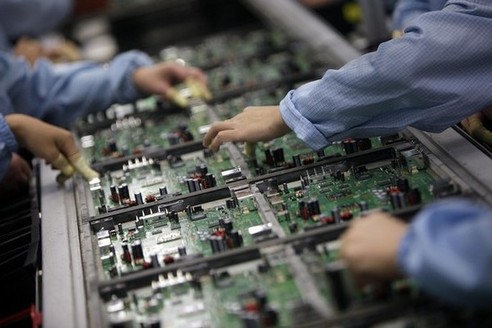PMI shows activity drops to 4-month low
 0 Comment(s)
0 Comment(s) Print
Print E-mail Shanghai Daily, March 23, 2012
E-mail Shanghai Daily, March 23, 2012
|
|
|
Preliminary figures from HSBC's Purchasing Managers Index shows that China's crucial manufacturing activity slumps to a four-month low in March. [File photo] |
Activity in China's crucial manufacturing sector fell to a four-month low in March, preliminary figures from HSBC's Purchasing Managers Index showed yesterday, stoking fears that growth in the world's second-largest economy may be slowing more than expected.
The amount of new orders received by factories fell to a reading of 48.1 in March, down from 49.6 in February and the fifth month in a row that manufacturing activity has contracted, according to the flash PMI survey compiled by HSBC and research firm Markit.
A reading of over 50 signals growth, while anything below this level indicates contraction.
HSBC said the figures signaled a weakening domestic demand in China and called for "further easing steps" from authorities to relax monetary policy and support growth.
Employment in the country's manufacturing sector is also at its lowest since March 2009, suggesting that companies were holding back from hiring staff because of a slowdown in production, the bank said.
"Weakening domestic demand continued to weigh on growth, as indicated by a slowdown in new orders, which came in at a four-month low," Qu Hongbin, the bank's chief economist for China, said in a statement. "Growth momentum could slow down further amid a combination of sluggish export new orders and softening domestic demand."
He added that this calls for further easing steps from the government.
Export orders continued to fall in March but at a slower rate than previously, the survey suggested.
Earlier this month, China reported a US$31.5 billion trade deficit for February, its biggest monthly deficit for almost 10 years, owing to subdued exports to Europe and the US.
Alistair Thornton, a China economist with IHS Global Insight in Beijing, warned that the PMI data could be volatile, but said the reading definitely showed a "downward momentum."
"Activity is slowing, but it is stabilizing. I don't expect to see a sharp bounceback this year," he explained.
JPMorgan said in a note that the drop in China's PMI data, combined with weaker exports and corrections in the housing market, "implies that economic growth will remain subdued in the coming months."






